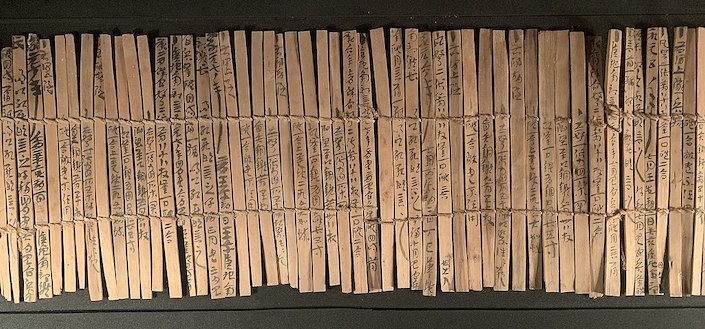Wooden slips dating back over 1,700 years unearthed in central China
Source: Xinhua Editor: huaxia 2023-12-22 17:00:16
CHANGSHA, Dec. 22 (Xinhua) -- Nearly 10,000 wooden slips dating back more than 1,700 years have been unearthed in central China's Hunan Province, providing important evidence for studies on the development and governance of the region in ancient times, said local archaeologists.
The slips, from the state of Wu during the Three Kingdoms period (220-280 A.D.), were found at the ruins of the ancient Dutou city, about 13 km from the seat of Linwu County of Chenzhou City.
The ruins comprise a government office zone, residential living areas, an industrial area and a burial site. The slips were discovered in two ancient wells in the government office zone.
Slips, typically made of wood or bamboo, served as the primary medium for writing among ancient Chinese people prior to the invention and popularization of paper. More than 300,000 slips have been unearthed in China so far.
. . .
Chen said that the government office zone, which was surrounded by moat, was in the shape of a square with sides measuring 100 meters. The residential area was located to the northeast, approximately 300 meters away, while ruins of a smelter were found to the northwest, around 10 km from the site. Archaeologists have also found about 400 tombs. ■
More:
https://english.news.cn/20231222/8950741620cb4e7ba027dc1e7f259964/c.html
~ ~ ~
2,000-year-old bamboo slips discovered in Yunnan

Thousands of bamboo slips (rectangles tied together to form books) have been discovered at the Hebosuo archaeological site in southwestern China’s Yunnan province.
The Yunnan Institute of Cultural Relics and Archaeology announced that more than 10,000 ancient bamboo and wooden slips, known as jiandu, have been found at the more than 2,000-year-old Hebosuo Site in Kunming, Southwest China’s Yunnan Province.
Bamboo or wooden slips were bound together to create “books” that could be written on and rolled up like scrolls before paper was invented and used extensively.
About 2,000 of them, or 1,300, are from the Han Dynasty (202 B.C.–220 A.D.), and 837 are seal impressions. In Western Han tombs, bamboo slips are frequently literary works and books about agriculture and medicine, but in this discovery, the majority of the writings is administrative.
The seal impressions are particularly noteworthy because they include official seals from 20 of the 24 counties ruled by the ancient Dian kingdom, a non-Han culture of agriculture-based settlements and exceptionally sophisticated metal workers centered in modern-day Yunnan. Emperor Wu of Han annexed the kingdom in 109 B.C.
More:
https://arkeonews.net/2000-year-old-bamboo-slips-discovered-in-yunnan/
